“As the world becomes more connected, the number of people living outside their home country is on the rise — more than 244 million globally, estimates the United Nations, up more than 40% since 2000.” (BBC Travel)

Starbucks, Guanajuato, Mexico (Author photo).
I’m sitting in Starbucks on a Friday morning writing my Sunday column for LoCO, a day before deadline. That’s been my routine for the last couple of years: by Friday I’ve considered and discarded a bunch of clickbait ideas and have finally narrowed the field down to a couple of contenders. In the next couple of hours, something will magically form on my iPad Mini screen, ready to be cleaned up and sent off to Hank with a photo or three. Usually the Starbucks in question is the one on 5th and E.
Today it’s on the Jardin Union in Guanajuato, Mexico. The baristas here are just as friendly as the ones in Eureka — a moment ago, we were all discussing — celebrating, really — the fact that Peña Nieto, Mexico’s president, had finally shown some spine by canceling his upcoming meeting with his US counterpart, after Trump’s recent rant about a wall and threat to tax Mexican-built cars at 20%.
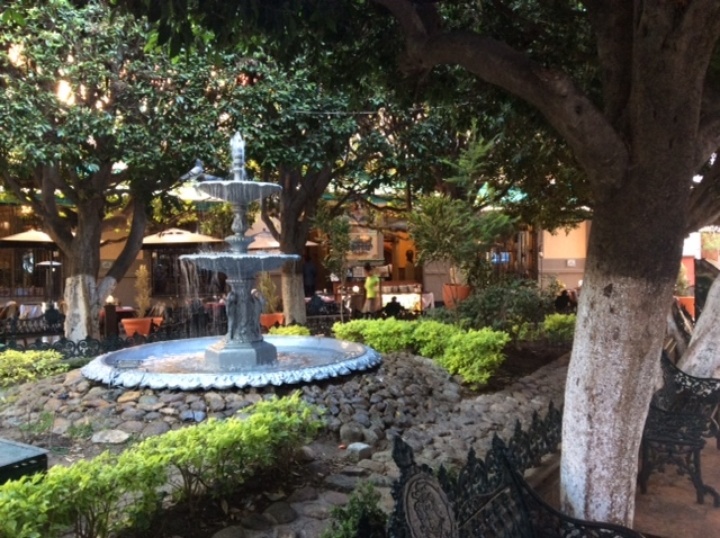
Jardin Union, Guanajuato, Mexico (Author photo).
Our president seems unable to grasp the simple fact that the way to stop illegal immigration from Mexico is to support that country’s economy, thereby making long, dangerous and expensive journeys across the border to “El Norte” unnecessary — the last ten years have seen border crossings decrease as the Mexican economy improves. Given only a slightly better situation, most Mexican laborers would opt to support themselves and their families at home, instead of living apart from their wives and children for years at a time in marginal conditions.
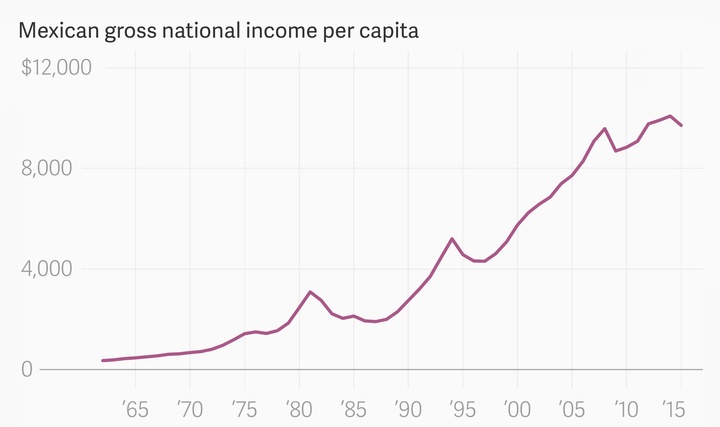
(World Bank, 2015 dollars)
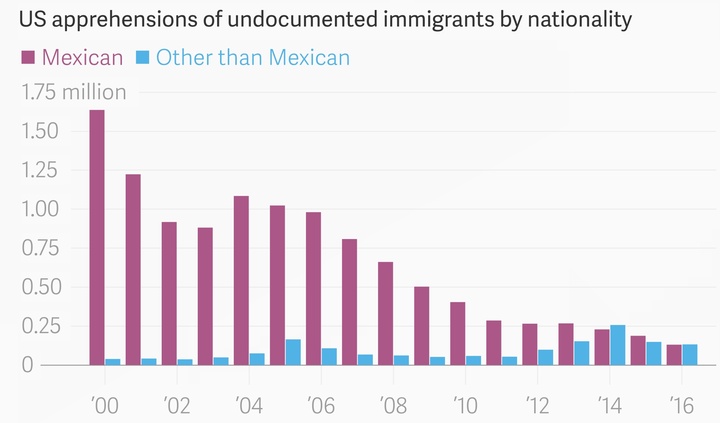
(US Dept. of Homeland Security, 2016 figures are October-May)
###
Louisa and I bought a house just five minutes walk away (on pedestrian-only streets) 12 years ago. Our plan at that time, and for the foreseeable future, was to balance our lives in Eureka, where we’ve been living in the same Old Town apartment since 2001, with contrasting conditions here in Guanajuato (a UNESCO World Heritage city). There, we’re at sea level; here, 6,800 feet. There, mostly grays, browns and earth tones; here, a vibrancy of primary colors. There, once a month everyone comes out to enjoy music and community on the streets of Old Town; here, it’s Arts Alive every day and night. There, we drive to hike; here, we walk out of our home and in 15 minutes we’re in the hills surrounding the city. This is our second home, where we base ourselves three-to-four months of the year (renting it out when we’re not here). Maybe one day it’ll be our first home.
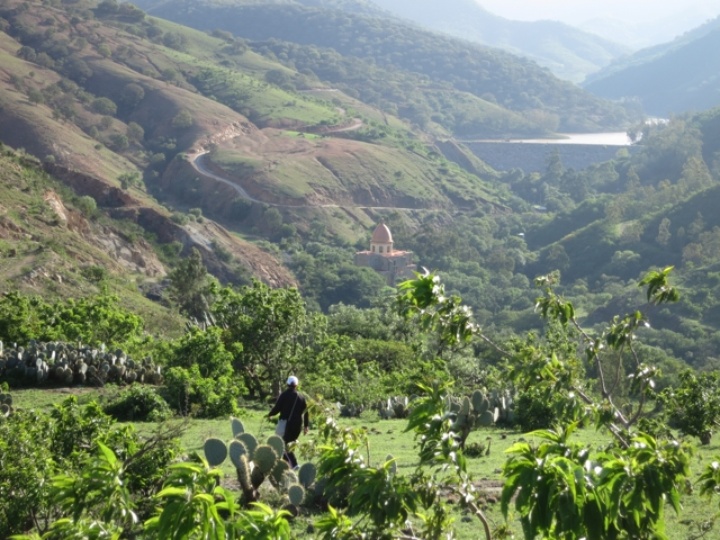
Peñafiel, one of our favorite hikes, 30 minutes walk from our Guanajuato home. (Author photo).
###
“If Trump gets elected, I’m going to move to Canada/Mexico/Australia/New Zealand.” I heard that a lot during the election cycle. Several celebrities said it too, including Miley Cyrus and Amy Schumer — they backed off, too bad. But there has been a definite increase in folks leaving or making firm plans to leave the US. The day after the election, for instance, New Zealand Shores (a relocation consultancy) saw a 600% uptick in web traffic.
In case you’re one of the many “I need to get out of here” dreamers, here’s some thoughts about relocating to Mexico that Louisa recently wrote for the blog “Get Rich Slowly”:
In 2005, my husband and I bought an old house in the center of Guanajuato, Mexico. The benefits — some of which we didn’t foresee when we bought the house — are many: having a stable investment during economic uncertainty in the U.S, especially the 2008 downturn; a potential future home if I’m widowed; enhanced fitness simply by walking everywhere; a community of both Mexican and expat friends to broaden our outlooks; and access to a world of home-exchange opportunities as a result of having an attractive home in a beautiful city.
…
If Barry died before me, [Ed: dream on!] I could see our Mexican home becoming my base, as I’m comfortable speaking Spanish and have friends there. Guanajuato is a very human-scale, appealing, walkable town. Walkability is a priority for me, as I witness the drawbacks my (no longer driving) 95-year-old father is facing in his typical U.S. car-centric suburb. I do not want to live in a car culture when I’m in my 80s and 90s (or now, for that matter).
Medicare is not covered outside the U.S., however, and some expat friends have moved back to the States as they aged and became more frail. Others have applied for Mexican health care insurance. As anyone familiar with “medical tourism” knows, you can get excellent and more affordable health care outside the U.S. We get our dental work done through our Mexican dentist, Gonzalo, who is the best, most thorough dentist we’ve ever had. I also had cataract surgery in Mexico. [Barry: I just had two crowns done here for under $300 total.]
…
It’s possible to live on very little in Mexico. We know many foreigners who earn an income in a variety of ways, including blogging, writing, offering workshops, leading tours, managing properties and teaching English. Creativity, initiative and an entrepreneurial spirit are essential.
If you’re interested in buying property in Mexico, you can go online and browse expat forums, but ultimately you can’t figure it out from a distance: you need to set aside some time to get to know the culture, find out about all the different options, and learn at least some Spanish. (We visited Guanajuato five times before we bought our house, renting various apartments and housesitting, and two of those visits spanned several months). With a standard six-month visa, you can explore different parts of the country, travel around on comfortable long-distance buses, rent a room or apartment in a town that appeals to you, and meet both locals and expats. Only then will you be able to decide if retiring in Mexico is right for you.
For us, buying a home in Mexico was one of the best things we ever did.
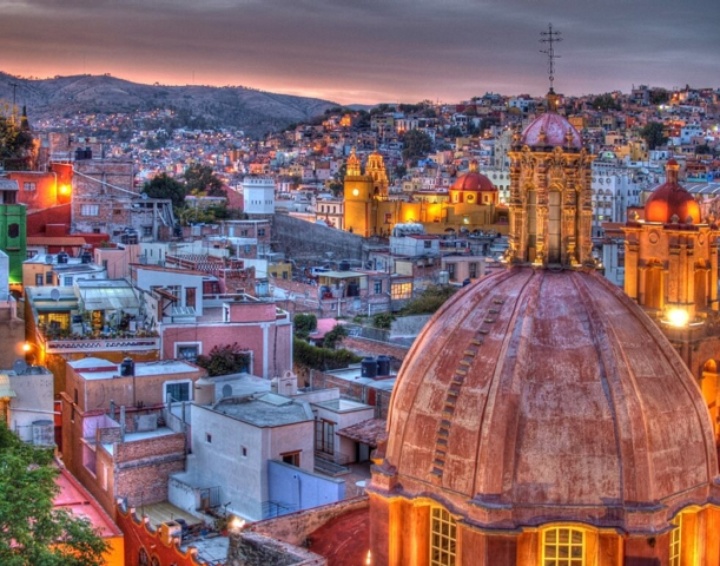
Guanajuato downtown at dusk (Author photo).
More on our Mexican lives in a future GOU.
###
Barry Evans gave the best years of his life to civil engineering, and what thanks did he get? In his dotage, he travels, kayaks, meditates and writes for the Journal and the Humboldt Historian. He sucks at 8 Ball. Buy his Field Notes anthologies at any local bookstore. Please.
CLICK TO MANAGE